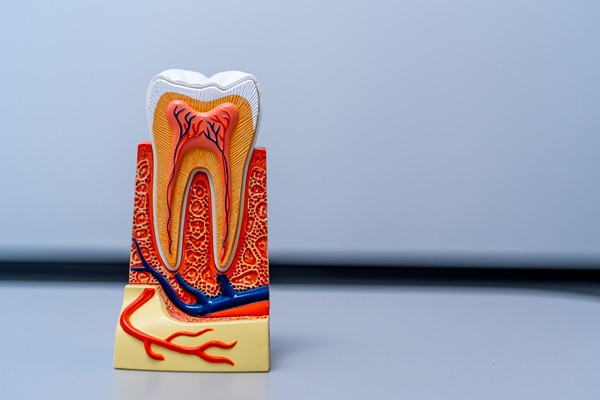Signs You May Need an Emergency Root Canal

An emergency root canal can be a lifesaver when you find yourself dealing with unbearable tooth pain. This is often the result of a severely damaged tooth with a compromised pulp chamber. It can also be from an infection that has made its way to the pulp and nerve.
Many things can damage a tooth and leave the pulp chamber compromised. These include tooth decay, trauma from an accident or an infection. A compromised pulp might not immediately lead to unbearable pain when it first occurs. That said, if the tooth is not treated, the pain will eventually become so unbearable that you will need to see a dentist.
What is a root canal?
Root canal therapy is commonly portrayed as a painful dental procedure. However, this is not the case. When you have an infected tooth, the dentist needs to remove the damaged tissue to stop the infection from spreading. This procedure also takes away the pain associated with this infection.
The dentist will flush out the tooth roots and the tooth pulp, leaving the tooth in place. They will ensure it is completely disinfected and then seal the void with a special material called gutta-percha. You may get a filling or crown to keep the tooth intact and secure. The procedure usually takes one to two hours.
Common signs that you need an emergency root canal
1. Unbearable pain
As was mentioned earlier, unbearable pain will prompt anyone to seek emergency dental services. The pain caused by a compromised pulp chamber is nothing like a regular toothache. It makes it impossible for you to get any sleep or focus on tasks.
When this occurs, waiting until the next business day is often not an option. You will want immediate relief from your ordeal. An emergency dentist will look over your teeth and may recommend you receive an emergency root canal.
2. Pus coming from a tooth
When a tooth is infected, pus might come out of the area around the tooth. This is a clear sign of an infection and that emergency care is needed. While an infected tooth can be easily treated in its early stages, waiting too long to treat it can have horrible consequences. The infection can lead to the loss of the tooth as well as spread to other areas of the body like the heart and brain. If the dentist thinks you cannot wait any longer, they will perform an emergency root canal to save the tooth.
3. A severely damaged tooth
If a tooth has been severely damaged by trauma, it might require a root canal to stop you from losing it. Because this damage often reaches the pulp, you will typically experience pain and discomfort when anything touches the tooth.
A root canal can be used to remove the pulp and nerves. This eliminates the pain, and the dentist will then use a crown to restore the tooth's appearance.
4. Tooth discoloration
A discolored tooth can be a sign that the nerves of a tooth have been damaged. If the discoloration is associated with pain or sensitivity to hot and cold things, a root canal is probably needed to save it. Much like a chipped or cracked tooth, a yellow tooth can be restored with a crown.
Get fast relief with an emergency root canal
Tooth pain is not something you can ignore. A minor ache that does not go away can turn into a nightmare scenario. To avoid long-term damage, you can get an emergency root canal at our Santa Rosa office. Schedule an appointment to get our dentist’s advice on the best way to treat your tooth.
Request an appointment here: https://santarosaendodontics.com or call Santa Rosa Endodontics at (707) 706-2143 for an appointment in our Santa Rosa office.
Check out what others are saying about our dental services on Yelp: Root Canal Treatment.
Recent Posts
A non-surgical root canal is an endodontic procedure known for preserving a tooth affected by severe decay, infection, or trauma, all without incisions in the gum tissue. Many patients become anxious when they hear the term "root canal," yet modern techniques can provide a gentler experience than expected. Endodontists often recommend this treatment when a…
A general dentist can perform basic tasks in tooth care, such as X-rays, oral examinations, filling cavities, and extractions. However, patients may be referred to an endodontist for more complex work, such as certain root canals. When is it likely for a dentist to refer a patient to this dental specialist?While a filling can fix…
Root canal treatment is often the first line of defense for treating teeth with compromised pulp chambers. The pulp chamber is the innermost layer of a tooth, and it stores nerves, blood vessels, and connective tissues. The chamber is sealed off from the rest of the tooth to protect it against bacteria and other irritants…
A root canal can preserve and strengthen a severely damaged or infected tooth. When seeing a root canal dentist, asking informed questions can provide clarity, ease concerns, and improve treatment outcomes. Understanding the procedure helps make the experience more comfortable and ensures you are well-prepared for each step.While each patient's situation is unique, the following…


